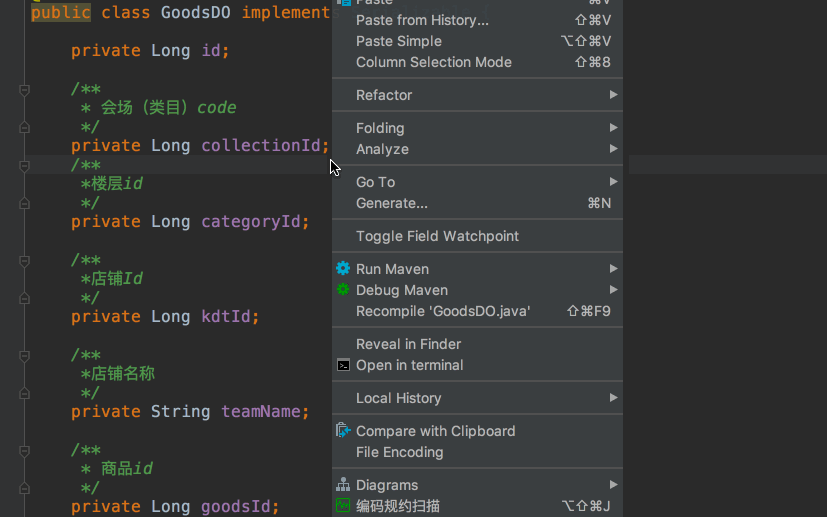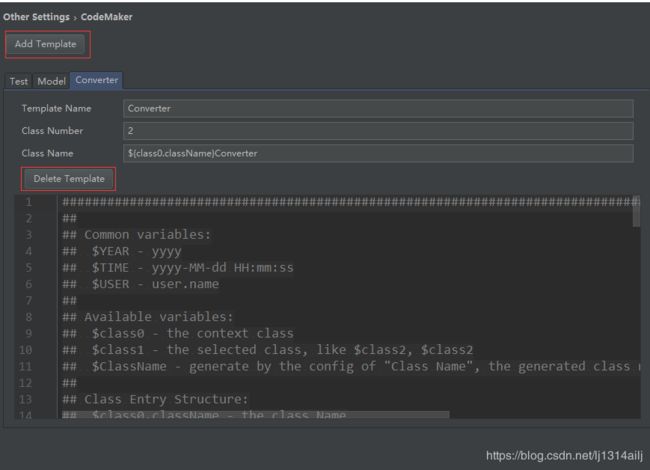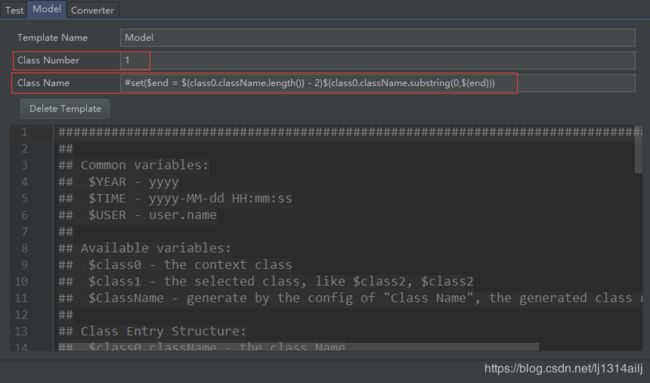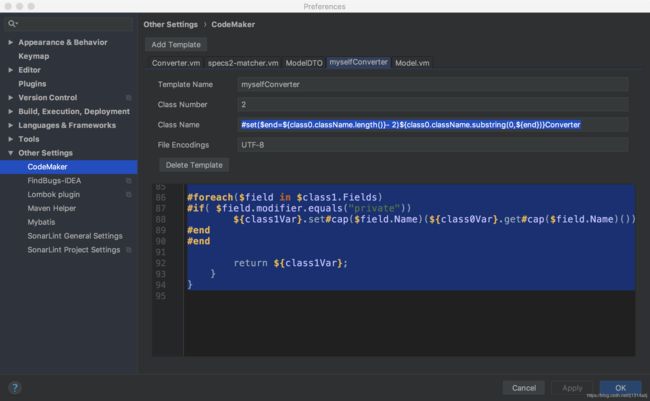IDEA 代码生成插件 CodeMaker
Java 开发过程中经常会遇到编写重复代码的事情,例如说:编写领域类和持久类的时候,大部分时候它们的变量名称,类型是一样的,在编写领域类的时候常常要重复写类似的代码。类似的问题太多……这里介绍一个 IDEA 的代码生成插件,通过Velocity支持自定义代码模板来生成代码。
项目地址:CodeMaker
下载地址:CodeMaker V1.2
主要功能
支持增加自定义代码模板(Velocity)
支持选择多个类作为代码模板的上下文
安装
下载插件:CodeMaker V1.2
1.打开设置,选择“Plugin”
2.在右边的框中点击“Install plugin from disk”
3.选择上面下载的“CodeMaker.zip”
4.点击“Apply”,然后重启 IDEA。
使用
在 Java 类编辑界面右键“Generate”,选择对应模板即可自动生成代码到当前类的包,大部分情况下生成的代码已经解决了百分之八十的问题,只需稍作修改,移动到合适的包中,就能快速完成代码编写。

完整生成:
如果代码模板需要除了当前类之外的类作为上下文,可以通过类选择框进行选择。
目前自带的两个模板:
1.Model:根据当前类生成一个与其拥有类似属性的类,用于自动生成持久类对应的领域类(在持久类拥有超过10个属性的情况下,能够节省大量时间)。
2.Converter:该模板需要两个类作为输入的上下文,用于自动生成领域类与持久类的转化类。
上面两个模板是我自己工作中常用的模板,仅供大家参考,自带的模板可能满足不了大家的需求,所以插件支持自定义新的代码模板。
1.增加模板:点击“Add Template”后,填写相关配置(都不能为空),点击保存后即可生效,无需重启。
2.删除模板:点击“Delete Template”就能将该模板删除
1.Template Name:在生成菜单中显示的名称,英文命名
2.Class Number:该模板需要的输入上下文类的数量,例如:如果为 1,,将当前的类作为输入: c l a s s 0 ; 如 果 为 2 , 需 要 用 户 再 选 择 一 个 类 作 为 输 入 : class0;如果为 2,需要 用户再选择一个类作为输入: class0;如果为2,需要用户再选择一个类作为输入:class0, $class1。
3.Class Name:生成的类的名称,支持通过 Velocity 进行配置,上下文为跟代码模板的相同。
模板上下文
模板上下文包含了以下变量:
########################################################################################
##
## Common variables:
## $YEAR - yyyy
## $TIME - yyyy-MM-dd HH:mm:ss
## $USER - user.name
##
## Available variables:
## $class0 - the context class
## $class1 - the selected class, like $class2, $class2
## $ClassName - generate by the config of "Class Name", the generated class name
##
## Class Entry Structure:
## $class0.className - the class Name
## $class0.packageName - the packageName
## $class0.importList - the list of imported classes name
## $class0.fields - the list of the class fields
## - type: the field type
## - name: the field name
## - modifier: the field modifier, like "private"
## $class0.methods - the list of class methods
## - name: the method name
## - modifier: the method modifier, like "private static"
## - returnType: the method returnType
## - params: the method params, like "(String name)"
##
########################################################################################
具体用法可参考自带的代码模板,通过模板上下文提供的定制能力,可以让每个用户都定制自己的风格的代码模板。
myselfConverter
########################################################################################
##
## Common variables:
## $YEAR - yyyy
## $TIME - yyyy-MM-dd HH:mm:ss
## $USER - user.name
##
## Available variables:
## $class0 - the context class, alias: $class
## $class1 - the selected class, like $class1, $class2
## $ClassName - generate by the config of "Class Name", the generated class name
##
## Class Entry Structure:
## $class0.className - the class Name
## $class0.packageName - the packageName
## $class0.importList - the list of imported classes name
## $class0.fields - the list of the class fields
## - type: the field type
## - name: the field name
## - modifier: the field modifier, like "private",or "@Setter private" if include annotations
## $class0.allFields - the list of the class fields include all fields of superclass
## - type: the field type
## - name: the field name
## - modifier: the field modifier, like "private",or "@Setter private" if include annotations
## $class0.methods - the list of class methods
## - name: the method name
## - modifier: the method modifier, like "private static"
## - returnType: the method returnType
## - params: the method params, like "(String name)"
## $class0.allMethods - the list of class methods include all methods of superclass
## - name: the method name
## - modifier: the method modifier, like "private static"
## - returnType: the method returnType
## - params: the method params, like "(String name)"#
########################################################################################
#macro (cap $strIn)$strIn.valueOf($strIn.charAt(0)).toUpperCase()$strIn.substring(1)#end
#macro (low $strIn)$strIn.valueOf($strIn.charAt(0)).toLowerCase()$strIn.substring(1)#end
#set($class0Var = "#low(${class0.ClassName})")
#set($class1Var = "#low(${class1.ClassName})")
package $class0.PackageName;
#foreach($importer in $class0.ImportList)
import $importer;
#end
import $class1.packageName.$class1.className;
/**
*
* @author $USER
* @version ${ClassName}.java, v 0.1 $TIME $USER
*/
@Data
public class $ClassName {
/**
* Convert ${class1.ClassName} to ${class0.ClassName}
* @param ${class1Var}
* @return
*/
public static $class0.ClassName convertTo${class0.ClassName}($class1.ClassName #low($class1.ClassName)) {
if (${class1Var} == null) {
return null;
}
$class0.ClassName ${class0Var} = new ${class0.ClassName}();
#foreach($field in $class0.Fields)
#if( $field.modifier.equals("private"))
${class0Var}.set#cap($field.Name)(${class1Var}.get#cap($field.Name)());
#end
#end
return ${class0Var};
}
/**
* Convert ${class0.ClassName} to ${class1.ClassName}
* @param ${class0Var}
* @return
*/
public static $class1.ClassName convertTo${class1.ClassName}($class0.ClassName #low($class0.ClassName)) {
if (${class0Var} == null) {
return null;
}
$class1.ClassName ${class1Var} = new ${class1.ClassName}();
#foreach($field in $class1.Fields)
#if( $field.modifier.equals("private"))
${class1Var}.set#cap($field.Name)(${class0Var}.get#cap($field.Name)());
#end
#end
return ${class1Var};
}
}


